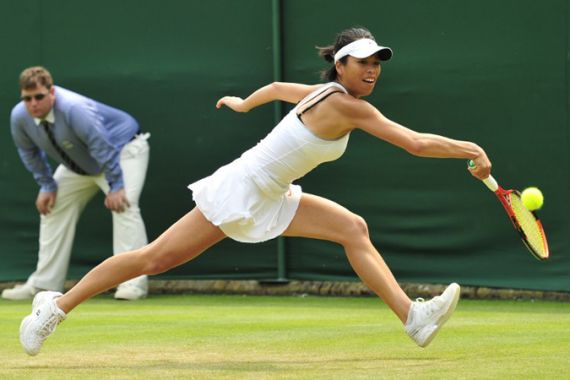A dream come true for Taiwan’s finest
A lack of funding for tennis in Taiwan has not deterred Lu Yen-hsun and Hsieh Su-wei from their Wimbledon dream.

To say Lu Yen-hsun was unhappy to see Andy Murray’s name in the second round is an understatement.
“I thought s***. I don’t say I have more chance against other seeds. He is just difficult to play at this moment. That’s why I’m thinking it’s not good,” says Lu to small room of journalists who explode at his expletive.
Keep reading
list of 4 itemsWTA Finals to be held in Saudi Arabia from 2024-2026
Djokovic, Ivanisevic split after 12 Grand Slam victories
‘Tragedy’: Tennis star Sabalenka heartbroken over ex-boyfriend’s death
“I still had to focus and win the first match but of course nobody wants to play Andy Murray first or second round. He’s too good.”
Murray proved that by defeating Lu easily in three-straight sets.
Those who come across Murray at Wimbledon are not just up against the second seed but also his army of loyal supporters. If the noise isn’t coming from inside Centre Court or Court One, then those on Murray Mound underneath the big screen take over.
“It’s a new experience for me. It’s also exciting like the Davis Cup. I am happy for him. I dream one day I play at home in front of a crowd like that.”
“Murray has handled the pressure well, many are expecting him to win and fortunately up to now he is doing very well,” the Taiwanese player told Al Jazeera.
Yet the chances of Lu playing in front of such a crowd in Taiwan are remote. It is a small miracle that Lu has made it to Wimbledon in the first place.
The small island, officially known as Chinese Taipei at sporting events, but Taiwan to most – lacks the funding and resources many European nations take for granted.
The second round also saw the departure of Taiwan’s female representative Hsieh Su-wei, who was knocked out by France’s Alize Cornet.
However, in her interview with Al Jazeera, she was in bright spirits after a victory in the women’s doubles and with the mixed doubles still to come.
“I feel happy and sad – just like a girl,” giggles Hsieh.
“Singles – I am not really happy, I struggled badly and did not play well but one good thing is we won the doubles.”
Taking part in all three competitions, Su-wei clearly loves to play tennis – but the conditions in Taiwan can test that love.
“The public sports are taekwondo, baseball and basketball – people do play tennis but it’s not that popular in Taiwan. I don’t have a training base, no physio, if I am injured I have to see a public doctor,” says Hsieh, the highest ranked Taiwanese women’s singles player ever.
“It’s not really that good – I don’t train in Taiwan as there is no one to train with and no court.”
Lu also shares her views on the state of tennis in Taiwan but is reluctant to complain. Tricky conditions are something sportsmen and women have come to accept.
“I have been doing this for 10 years now – there is always discussion about this point. We can’t always complain we have to solve this problem.”
“We would like to travel with a national coach who speaks the same language but we don’t find professionals in every part of the game so we have to find foreign coaches. We travel a lot and hope conditions can improve in Taiwan.
“In the last 10 years the federation are doing a bit more to support some juniors – but they should do more.”
The main problem Lu says is the lack of courts, and crucially the poor maintenance of existing courts – but Hsieh struggles with a problem more difficult to solve.
“I am quite a difficult player to coach,” she says giggling again.
“The culture is a little bit different as I am used to training with my father. I tried to train with other coaches but sometimes they don’t understand your game. The coach I have now is very nice and patient.”
Clashes with foreign coaches are understandable considering Hsieh’s unique game, she uses a double handed grip on both forehands and backhands.
“Yes I do play double-handed but here is also strange,” she says tapping her brain.
Join the club.
So does she give herself or other people a hard time?
“I give other people a hard time,” she says light-heartedly, “I am quite good at that.”
I ask Hsieh what she thinks about the number of players withdrawing in round two.
“It’s quite sad but maybe it’s good for other people. In other tournaments it’s difficult to beat those players so we might have more chance here.”
With the tough conditions back in Taiwan, it’s an advantage players like Hsieh are ready to take.
Joanna Tilley is a freelance journalist working with Al Jazeera on the Sport website and reporting from the Wimbledon Championships. She has worked at Sky News, Sky Sports News and LBC Radio.
Follow her on Twitter (@joannatilley) or her website, http: //mythoughtonsport.blogspot.com.
Al Jazeera is not responsible for the content of external websites.